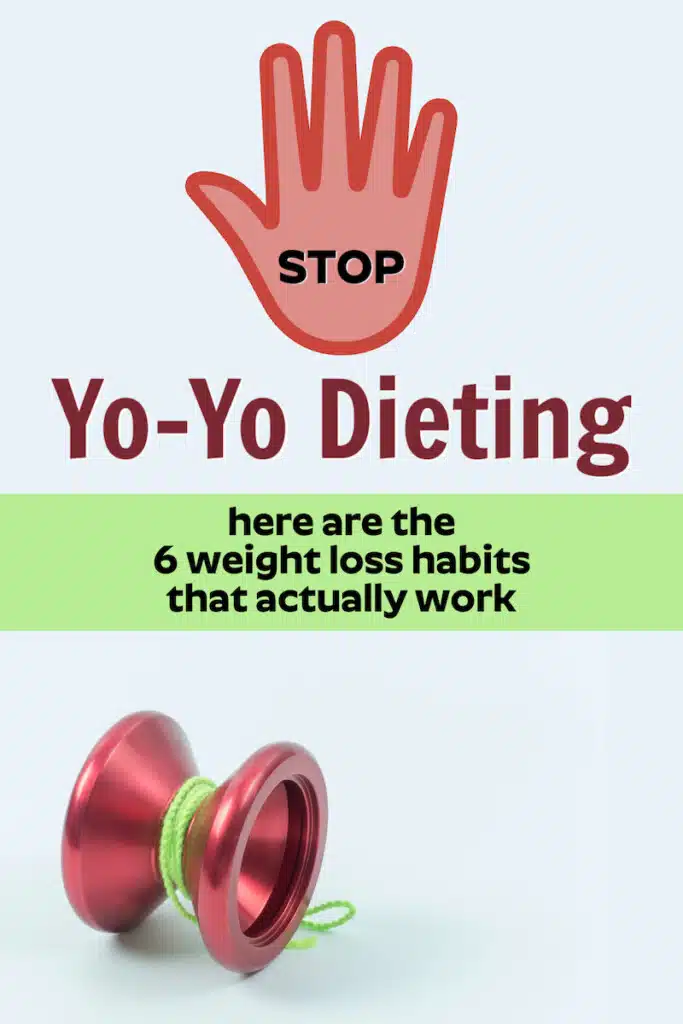Yo-yo dieting, a frustrating cycle of weight loss followed by weight gain, is a challenge many individuals face trying to achieve and maintain a healthy weight. Here, I’m sharing the detrimental effects of yo-yo dieting and presenting instead a sustainable approach to healthy body composition – through what I believe to be the six most effective weight loss habits.
Understanding The Yo-Yo Dieting Dilemma
While restrictive eating and extreme exercise regimens might offer quick results initially, they often lead to the infamous yo-yo dieting effect, where the lost pounds return, sometimes with a few extras.
Fortunately, the following habits – when combined – can help you not only shed unwanted pounds but also prevent them from returning, ensuring long-term success in your weight loss journey.
6 Habits to End Yo-Yo Dieting & Find Lasting Weight Loss
It’s helpful to understand why yo-yo dieting occurs:
- Our bodies have evolved over centuries to protect against famine by storing excess energy as fat.
- When you engage in extreme calorie restriction, your body interprets it as a potential period of scarcity, triggering a survival mechanism that preserves fat stores.
- This mechanism can make weight loss challenging. If you’ve been on restrictive diets in the past, your body might be convinced that storing fat is essential for survival, contributing to the yo-yo dieting effect.
Here are the six habits that help end yo-yo dieting so you can stay trim once and for all.
Habit 1: Shave Off 200 Calories from Your Diet
A common misconception when trying to lose weight fast is adopting extreme fasting or crash diets. While these methods may yield initial results, they often lead to returning to old eating habits and regaining lost weight, perpetuating the yo-yo cycle.
Instead, consider a sustainable approach.
Start by reducing your daily calorie intake by a modest 200 calories. This reduction is manageable and doable in the long run.
Over time, it can make a significant difference on the scale without causing discomfort or triggering your body’s fat storage mechanism.

Think of it as a permanent habit upgrade rather than a temporary diet. By consistently consuming 200 fewer calories each day, you’ll set the stage for gradual and lasting weight loss.
Habit 2: Burn 300 Calories Through Daily Exercise
Exercise plays a crucial role in weight management and overall health. However, relying solely on one type of exercise, like running on a treadmill daily, can lead to overuse injuries and muscular imbalances.
To combat this, engage in cross-training, where you alternate between different types of exercises. This approach keeps your body engaged and responsive, reducing the risk of plateauing and injuries. The goal is to burn at least 300 calories through exercise daily, promoting steady weight loss.
Remember, consistency is key. Incorporate a variety of physical activities into your routine, ensuring that you stay motivated and achieve better overall results.
Habit 3: Hydrate When You Feel Hungry
Sometimes, the body’s signals for hunger can be confused with dehydration. When you think you’re hungry, try drinking a glass of water instead of reaching for a snack. Often, your body will feel satiated within minutes, curbing unnecessary calorie consumption.
Hydration is essential for metabolism, as it supports the process of utilizing fat cells for energy. Staying adequately hydrated can be a fast way to lose weight by preventing unnecessary calorie intake.
Habit 4: Prioritize Quality Sleep
Quality sleep is a crucial factor in successful weight loss. When you don’t get enough rest, your body’s various systems, including metabolism, operate less efficiently. To improve your sleep quality:
- Avoid caffeine after 3:00 pm.
- Limit screen time before bedtime.
- Enhance your bedroom environment for better sleep, using blackout curtains, white noise machines, earplugs, and an eye mask if necessary.
Quality sleep allows your body to function optimally and supports your weight loss efforts.
Habit 5: Opt for Whole Foods Over Processed Ones
The quality of your food choices plays a significant role in your weight loss journey. Highly processed foods can require more effort for your body to digest and often contribute to weight gain. In contrast, whole foods, such as vegetables, lean proteins, and healthy fats, promote better overall health and efficient metabolism.

Transitioning to a diet rich in whole foods and lower in processed ones can lead to initial water weight loss and long-term weight management. Whole foods provide essential nutrients and support your body’s efficient functioning, including metabolism.
Habit 6: Break Free from Yo-Yo Dieting Patterns
Breaking free from yo-yo dieting requires a shift in perspective from temporary diets to lasting lifestyle changes. Instead of following a restrictive diet for a short period and reverting to old habits, embrace an anti-inflammatory lifestyle.
The anti-inflammatory lifestyle focuses on removing habits and behaviors that don’t contribute to long-term well-being. It emphasizes:
- Primarily consuming vegetables, some meat, and fruit.
- Choosing healthier fats like avocado and olive oil.
- Periodically incorporating a cheat meal after reaching your target weight.
The Science Behind Permanent Weight Loss
Three recent studies underline the benefits of permanent nutritional lifestyle improvements over temporary drastic diets for weight loss and health management:
Scientific evidence of diets for weight loss: This study highlights that while high-protein, low-carbohydrate diets and intermittent fasting may offer short-term weight loss benefits, they can have adverse effects. Long-term success in weight management is more about adherence to a balanced diet that creates a negative energy balance and prioritizes food quality for health promotion. This suggests that sustainable dietary approaches, rather than drastic short-term diets, are key to long-term weight management.
Evidence-based weight loss interventions: This review delves into various treatments for obesity, including lifestyle, diet, and exercise interventions, which, on average, produce a weight loss of 5% to 7%. The study also discusses the limitations of current FDA-approved medications for obesity management and highlights the necessity of a “continuous treatment model” for obesity, indicating the importance of long-term lifestyle changes over quick fixes.
Intensive lifestyle change: An article on Harvard Health Blog reveals how intensive lifestyle changes, including significant improvements in diet and increased physical activity, can lead to improved sleep, increased energy, and weight loss. The piece emphasizes the need for a holistic approach to health that goes beyond diet to include physical activity and other lifestyle factors for sustained health benefits.
The Age Factor and Yo-Yo Dieting
As you age, your body’s ability to burn calories efficiently changes.
Metabolism tends to slow down after the age of 50, making it more challenging to bounce back from aggressive weight loss efforts.

Shift Your Perspective from “Dieting” to “Healthy Lifestyle Change”
To prevent the yo-yo diet effect, focus on sustainable habits that prioritize your health. Prioritize a healthier eating plan that includes:
- Ample water consumption.
- Intermittent fasting if suitable for your lifestyle.
- Regular consumption of various vegetables.
- Incorporating healthier fats into your diet while not increasing your circulating cholesterol levels.
- Prioritizing nutrient-rich foods over empty calories.
The typical concept of dieting is very middle-of-the-last-century.
On the classic diet, you’re supposed to eat a certain way for a short while, lose weight, then go back to eating the way you always have and still keep that lost weight off.
It defies logic.
“As simple as calories in vs. calories out? Not really. Even when you can digest something and convert it into calories, the process requires that you “burn” calories. This so-called thermic effect of food is greater for protein than for fat or carbs, and it can be affected by your age, the timing of your meal, and various other factors. Drastic diets aren’t only hard to maintain, they can also deprive you of some of the nutrients you need to stay healthy,[24] and they make it hard to exercise.”
–Kamal Patel, MPH, MBA, PhD(c) in Nutrition
Instead of adopting a temporary diet, implement a lifestyle change.
The anti-inflammatory lifestyle is a method of living that seeks to remove unnecessary irritants from your experience. Any habits or behavior patterns that don’t help you to thrive in the long term are released.

The dieting part of the anti-inflammatory lifestyle usually involves eating vegetables primarily and some meat and fruit. How much protein and carbohydrates one consumes is based on physical activity level – they have to be earned.
Once you reach your target body weight, you can experiment with a celebratory, weekly “cheat” meal that allows for a bit more calories and carbs.
End Yo-Yo Dieting! Conclusion on the 6 Habits for Permanent Weight Loss
Everyone worries about their weight sometimes.
It can be frustrating to go from doing everything right for a while – and feeling proud about it – to sliding into previous habits, gaining back the pounds you lost, and adding a couple of new pounds on top of that.
It’s typical yo-yo dieting pattern.
It’s extremely common – and can be profoundly disheartening – for the dieter working hard while on a sort of emotional roller coaster.
Digesting food is a significant effort for the human body. Giving your body a bit of a rest from having to digest so much might free up its energy to work on healing in other parts of the body.
When a person starts eating more whole foods and less processed foods, that usually results in a higher protein intake and fewer carbohydrates (from flour and sugar). Because of this, it’s common to lose 8 pounds of water weight right away – usually in the first couple of weeks. This is natural and the reason why the weight loss is averaged over the full-time period (you might lose weight quickly in the beginning and less quickly toward the end, but the average remains the same: about one pound each week).
Some people believe running on a treadmill daily is the only fast way to lose weight. However, doing the same type of exercise daily can cause overuse injuries and muscular asymmetry in the body.
Also, working out – on its own – doesn’t burn as many calories as people hope. The screen report on the cardio machines at the gym will often exaggerate the number of calories burned during a training session.
The yo-yo diet effect often occurs when someone tries to lose weight too quickly.
The human body has evolved over the millennia to protect itself from periods of famine.
A body will hold on to fat cells to create emergency energy-storage tanks. That way, you’ll be less likely to die while crossing the desert or being stranded in a snow blizzard and experiencing starvation.
Any time you’ve been on a very restrictive diet, you have signaled to your body, “famine is an expected part of my experience.” So, naturally, your adaptive body will recognize that fat-cell storage is still necessary.
To understand this better, it’s helpful to adopt an ancestral perspective. After all, it’s only recently that manufacturing and industrialized foods have become a reality. In most of human history, periods of famine were pretty standard.
Therefore, it’s wise to lose weight incrementally to prevent metabolic alarm bells from going off inside your body – usually reducing fat by approximately one pound (0.45 kilo) each week.
An exception would be if you were, say, 5’2″ and 260 pounds (118 kilos). Morbidly obese is an unfortunate term that sounds judgmental but is a scientific way to convey that a person is over 80 pounds (37 kilos) above their ideal weight. In such a specific scenario, losing weight faster than one pound each week might be appropriate.
We human beings are peculiar creatures. It takes us a year to add 40 extra pounds, and yet we expect to successfully lose those 40 pounds in six weeks and keep them off permanently!
In reality, consistency wins this race.
Consistency and a shift towards a healthier lifestyle are the keys to success. Embrace these habits, prioritize your health, and say goodbye to yo-yo dieting for good.
I encourage you to consult with your medical doctor before making any significant changes to your eating patterns.
Sustainable weight loss is within reach, and these habits will guide you on your journey to a healthier, happier you.
Helpful Sources for Avoiding Yo-Yo Dieting and Building Good Weight Loss Habits:
Research on Weight Cycling – https://pubmed.ncbi.nlm.nih.gov/27773644/
Metabolic Syndrome and the Yo-Yo Diet Effect – https://pubmed.ncbi.nlm.nih.gov/17283263/
Weight Gain After Dieting – https://www.nytimes.com/1981/02/24/science/the-science-of-dieting-a-fight-against-mind-and-metabolism-027184.html
